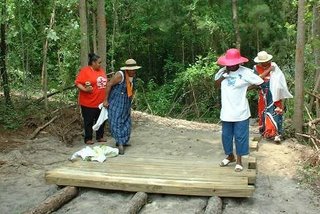 When I was in grade school, once a week we got greens, corn bread, pinto beans and cole slaw for lunch. I traded out my plate for everyone else's slaw. Greens - yuk.
When I was in grade school, once a week we got greens, corn bread, pinto beans and cole slaw for lunch. I traded out my plate for everyone else's slaw. Greens - yuk.Fast forward more than a few decades and I love collards and most other greens. I'm learning how to cook them - and what better place to do so than in Maxton, North Carolina. Oh, and by the way, that's where the largest Campbell's Soup plant is located. Employees used to have their company picnic at the NC Zoo when I worked there.
Maxton is located just east of Laurinburg off US Hwy. 74 in North Carolina. It's a charming little community that is undergoing economic change. But one thing stays constant: collards.
The Collards Festival is held each fall and is one of the most authentic festivals I've ever attended. You don't find typical street vendors. Instead, you meet the people who daily go into their own gardens and pick the large leafy green, cook it and eat it. They're the ones who serve up scrumptuous, mouth-watering collards - and they even put them in sandwiches.

In your cast iron skillet, drop into hot oil two large dollops of corn bread batter to make some fry bread. Drain it. Load one with a big scoop of cooked collards, topped with some chow chow and even a hot pepper. Cover with the second piece of bread. Oh, now that's some mighty fine eating!!
I learned that to clean collards, you must first wash them very well. You don't want specs of sand in your greens. Pull out the stems, using only the leaves. Cook them in water until they're tender. Soul food cooks add a little side meat, or fat back. You can add some ham or even olive oil. You may want to put in a little garlic, salt and pepper - and a tiny bit of sugar. When the leaves are nice and tender, dig in.
The Collards Festival and Maxton. This is a story that has gotten no press until now. For more information, contact the Lumberton CVB at 910-739-9999 or log onto www.lumberton-nc.com.


